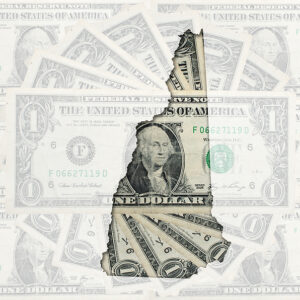Despite overwhelming support from House Democrats, a plan to give millions of tax dollars to New Hampshire political campaigns was defeated Tuesday in a 201-163 vote.
The bill, HB324, would set aside tax dollars to fund campaigns for governor and executive council, including $1 million grants to gubernatorial candidates running in a contested general election. Executive Council candidates would each get $60,000 for a contested election.
“Today’s vote defeated a $6 million boondoggle which attempted to funnel tax dollars from New Hampshire’s families into the pockets of political consultants and operatives,” said House Election Law Committee Vice Chairman Ross Berry (R-Manchester), who has worked at a campaign strategist himself.
In addition to the lump-sum payments, gubernatorial candidates could receive up to $420,000 via “voter dollars” — $100 in taxpayer-funded vouchers that would be issued to every registered voter in the state. Campaigns would be given tax dollars when they cashed in the vouchers.
Urging his colleagues to support the measure, Rep. Russell Muirhead (D-Hanover) acknowledged once the bill was fully implemented it would indeed cost $6 million but said it would be tax money well spent.
“Before any candidate faces voters they have to succeed in a different primary — a donor primary,” Muirhead said. “They have to appeal to out-of-state donor elites, people who don’t live in New Hampshire and don’t know New Hampshire.
The legislation would limit contributions participants could receive from other sources, including limiting private contributions from out-of-state to just 10 percent of the total received. However, the law wouldn’t — and can’t — limit spending by independent groups like PACs on a candidate’s behalf.
“This bill seeks to disempower the out-of-state donor elite by giving every voter $25 certificates they can give to candidates they support. It turns voters into donors,” Muirhead added.
To participate, candidates would be required to collect a minimum number of small-dollar donations (between $5 and $250, depending on the office) to show they have support among the voters. Candidates for governor would need 2,500 unique contributors while executive council candidates would need 5oo.
Taxpayer funding of political campaigns has found little support across the country, and while little polling has been done on the topic the available data show most Americans reject the idea. All but 20 House Democrats backed the bill, while every Republican opposed it.
Opponents note the program would take money from the general public and give it to candidates who might have views many find objectionable, forcing them to pay to promote ideas on abortion, guns, election integrity, etc. many Granite Staters oppose. Berry argued the legislation could be unconstitutional, violating the right to freedom of association and freedom of speech.
Muirhead disputed that contention, pointing out Maine and Washington have passed similar programs. He also referenced the federal Presidential Election Campaign Fund; however, it is funded with voluntary $3 contributions.
“Voting this down was a win for every person who does not want their hard-earned money going towards a candidate that holds the complete opposite value set than their own,” Berry said.



